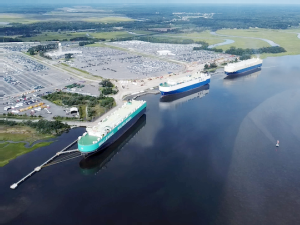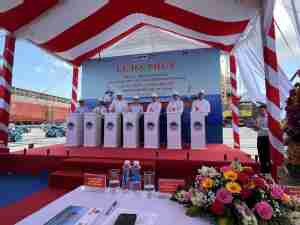Despite unprecedented global demand for oil and commodities, freight rates for tankers and dry bulk carriers have remained near multi-year lows as a flood of new vessels worsens a lingering oversupply problem.
Dozens of top executives and government officials will converge in Singapore on Monday for the city-state's annual Maritime Week to discuss the long list of challenges for the freight industry and how to survive them.
"If you take a snapshot of the market, demand is reasonable and back up to pre-crisis levels but the oversupply is keeping a lid on the market," said Andrew Lockie, director of International Shipcare, which manages vessels left idle by owners because of poor economic conditions.
"The writing is on the wall for a depressed market for this year, next year and probably extending into 2013."
South Korea's second biggest dry bulk shipping firm, Korea Line, has been the most high-profile casualty so far this year, filing for bankruptcy protection in January after struggling to stay afloat amid a sharp drop in freight rates.
Others were poised to follow. U.S.-based container shipper Horizon Lines warned last month it could also be forced to seek bankruptcy protection for not being able to comply with its debt agreements.
Difficult Market
The Baltic Exchange's Dry Index , the benchmark for seaborne trade and a key indicator of global economic activity, has struggled to recover from a two-year low of 1,043 points reached in February.
The oversupply problem stems from the industry's buying spree before the economic downturn two years ago, with those vessels only now coming to the market.
In the dry bulk market, the global fleet responsible for shipping iron ore, coal, grains and other commodities is expected to grow between 11 and 13 percent this year to top a record 600 million deadweight tons.
That would far outpace demand growth of between 5 to 8 percent, analysts said.
High Fuel Prices, Piracy
On top of the oversupply problem, bunker fuel costs for shipowners have surged this year in tandem with multi-year high oil prices, cutting into profit margins.
Shipping companies have adjusted their contracts with clients and introduced additional fuel surcharges to ensure operating costs do not dip below earnings.
The industry also faces intensifying piracy attacks in the Gulf of Aden and Indian Ocean, and the potential threat of radiation exposure from Japan's quake-crippled Fukushima nuclear complex.
"This is something we monitory very closely," said Lam Yi Young, chief executive of the Maritime and Port Authority of Singapore, about the nuclear crisis in Japan.
"The advisory from the IMO (International Maritime Organization) is that the present situation does not require any screening of any vessels or cargo originating from Japan." (Reuters)










